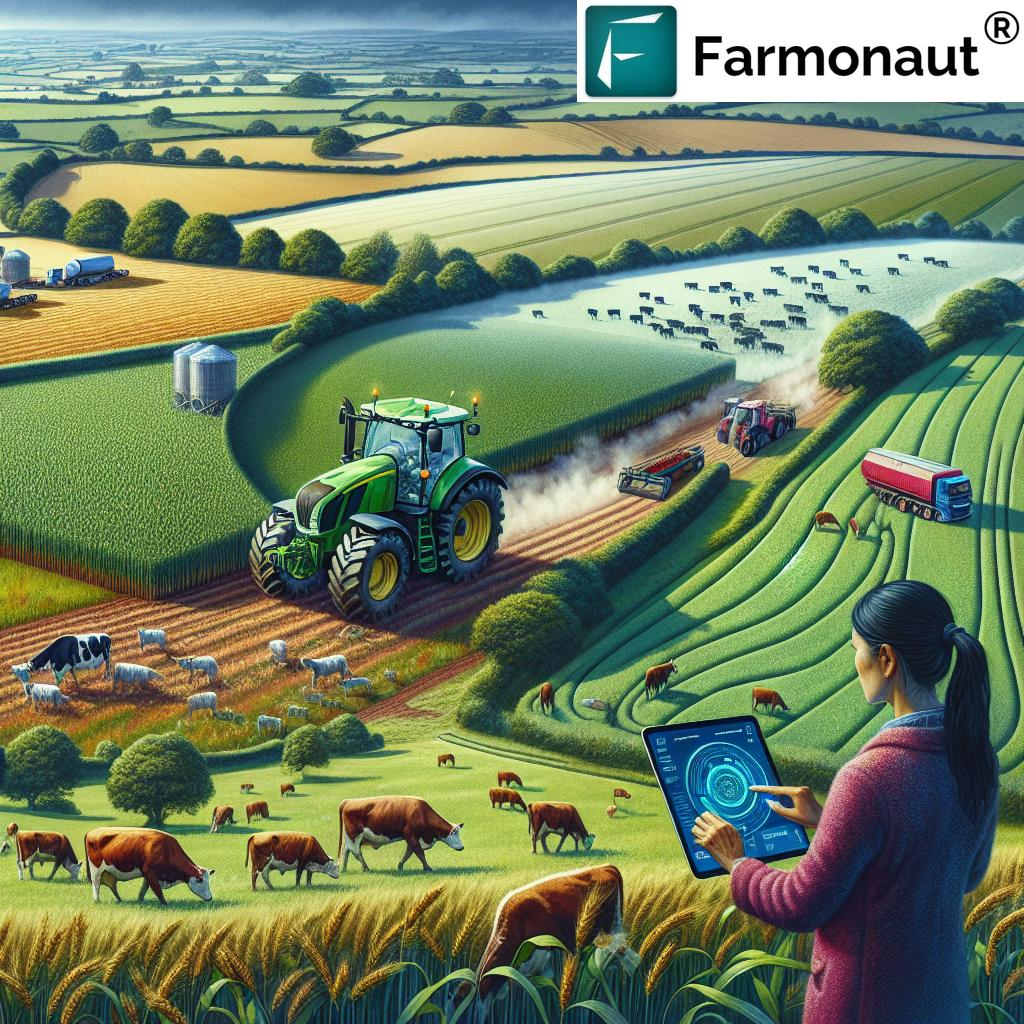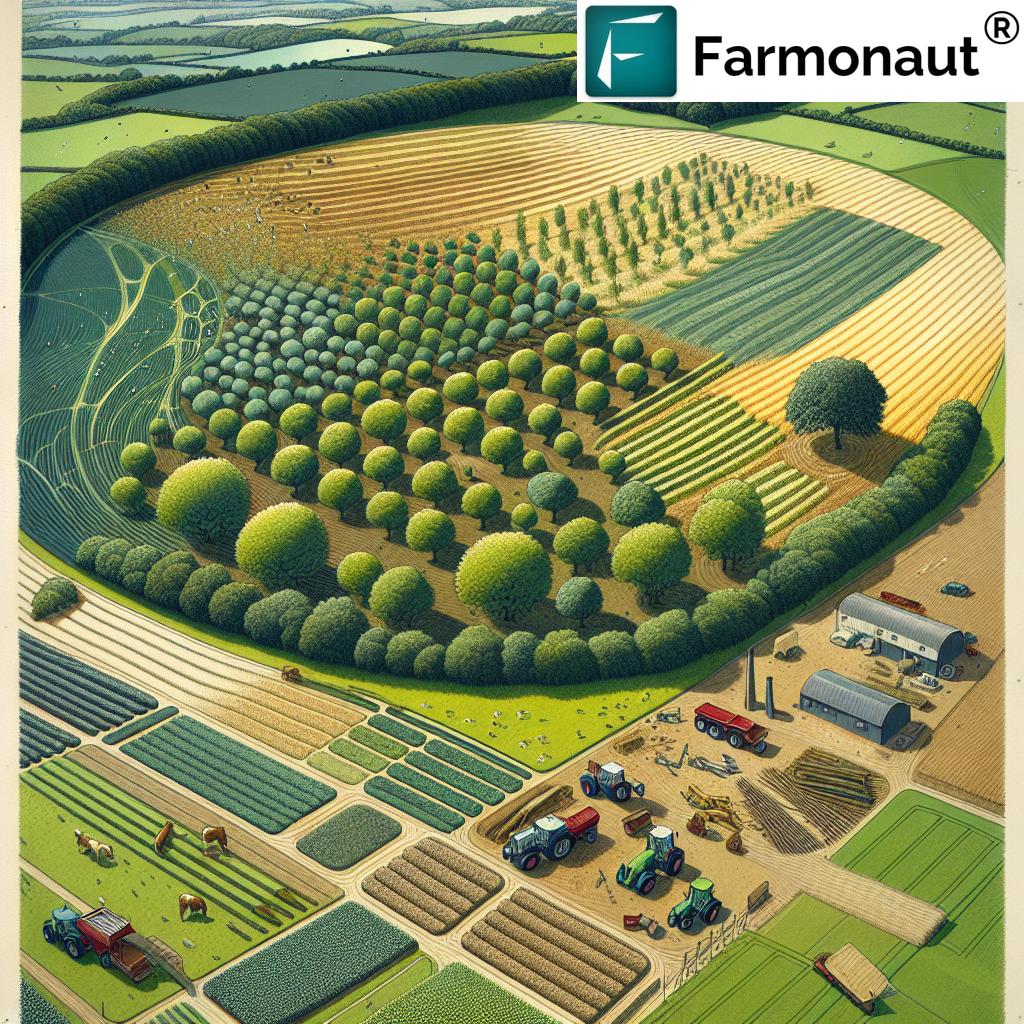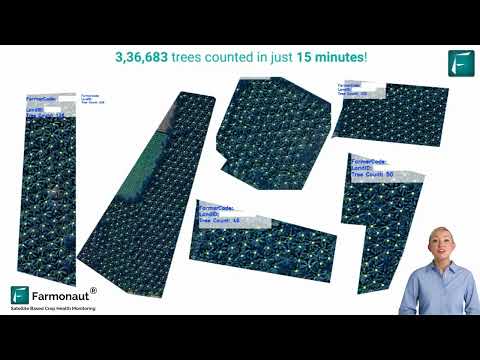UK Farmers: Rethink Carbon Offsetting and Tree Planting for Sustainable Agriculture
“UK farmers are reassessing carbon offsetting strategies, with recent reports revealing flaws in tree planting initiatives for sequestration.”
In the ever-evolving landscape of UK agriculture, we find ourselves at a crucial juncture where farmers are being called upon to reassess their approach to carbon offsetting and sustainable farming practices. As representatives of Farmonaut, a leading agricultural technology company, we’re here to guide you through the complexities of this issue and offer insights into how UK farmers can navigate these challenges.
The recent revelations about the flaws in tree planting initiatives for carbon sequestration have sent ripples through the agricultural community. This blog post will delve into the intricacies of carbon management in agriculture, exploring alternatives to simple tree planting and highlighting the need for a more comprehensive approach to sustainability on UK farms.
The Carbon Conundrum: Why UK Farmers Need to Rethink Their Approach
Carbon offsetting has long been touted as a solution for mitigating the environmental impact of farming. However, recent reports have cast doubt on the efficacy of certain offsetting strategies, particularly those centered around tree planting. Let’s break down the key issues:
- Overestimation of carbon sequestration potential
- Lack of long-term monitoring and maintenance
- Potential negative impacts on biodiversity
- Insufficient consideration of soil health
These revelations have left many UK farmers questioning their current carbon management strategies. It’s clear that a more nuanced and holistic approach is needed to truly address the carbon footprint of agricultural activities.
Beyond Tree Planting: Exploring Sustainable Agriculture Practices
While tree planting can play a role in carbon sequestration, it’s crucial for UK farmers to consider a broader range of sustainable agriculture practices. Here are some alternatives that can contribute to carbon management and overall farm sustainability:
- Soil carbon management: Implementing techniques like no-till farming, cover cropping, and crop rotation to enhance soil health and increase carbon storage.
- Precision farming: Utilizing technologies like those offered by Farmonaut to optimize resource use and reduce emissions.
- Agroforestry: Integrating trees and shrubs into crop and animal farming systems for improved carbon sequestration and biodiversity.
- Wetland restoration: Rehabilitating wetlands on farmland to act as natural carbon sinks and improve water quality.
- Livestock management: Adopting practices like rotational grazing and improved feed efficiency to reduce methane emissions.
By diversifying their approach to carbon management, UK farmers can create more resilient and sustainable agricultural systems.

The Role of Technology in Sustainable Farming
At Farmonaut, we believe that technology plays a crucial role in helping farmers implement and monitor sustainable practices. Our satellite-based farm management solutions offer valuable tools for precision agriculture, including:
- Real-time crop health monitoring
- AI-based advisory systems
- Blockchain-based traceability
- Resource management tools
These technologies empower farmers to make data-driven decisions that can significantly reduce their carbon footprint while improving productivity. For instance, our satellite imagery can help optimize irrigation and fertilizer use, reducing both costs and environmental impact.
Explore our cutting-edge farming solutions:
The Importance of Verified Carbon Credits
As UK farmers reassess their carbon offsetting strategies, the concept of verified carbon credits becomes increasingly important. These credits represent a quantifiable and certifiable reduction in greenhouse gas emissions, providing a more reliable measure of a farm’s carbon mitigation efforts.
Key benefits of verified carbon credits include:
- Increased credibility of offsetting claims
- Potential for additional income streams
- Improved market access for environmentally conscious consumers
- Alignment with government sustainability goals
However, it’s crucial for farmers to work with reputable verification bodies and understand the requirements for earning these credits. This is where Farmonaut’s expertise can be invaluable, helping farmers navigate the complexities of carbon credit systems.
Balancing Ecology and Farm Economics
“Balancing farm economics with ecological responsibilities requires farmers to consider verified carbon credits and accountable offsetting programs.”
One of the most significant challenges facing UK farmers is the need to balance ecological responsibilities with the economic realities of running a profitable farm business. This balancing act requires careful consideration of various factors:
- Short-term costs vs. long-term benefits of sustainable practices
- Impact on crop yields and livestock productivity
- Potential for new revenue streams through carbon credits or eco-friendly products
- Compliance with evolving environmental regulations
By leveraging technologies like those offered by Farmonaut, farmers can gain valuable insights into the economic implications of their sustainability efforts. Our AI-driven advisory system, for example, can help farmers optimize their operations for both profitability and environmental impact.
Land Use Decisions: A Critical Factor in Farm Sustainability
The allocation of farmland for different purposes is a crucial decision that impacts both the economic viability of a farm and its environmental footprint. When considering carbon offsetting strategies, UK farmers must carefully evaluate how different land use options affect their overall sustainability goals.
Key considerations for land use decisions include:
- Productive capacity of different land parcels
- Potential for integrating carbon sequestration practices with existing operations
- Impact on local ecosystems and biodiversity
- Long-term maintenance requirements and costs
Farmonaut’s satellite-based monitoring can provide valuable data to inform these decisions, offering insights into soil health, crop performance, and land use efficiency across the farm.

Comparative Analysis of Carbon Offsetting Strategies
To help UK farmers make informed decisions about their carbon management strategies, we’ve compiled a comprehensive comparison of different approaches:
| Offsetting Strategy | Carbon Sequestration Potential (tonnes CO2/hectare/year) | Biodiversity Impact | Implementation Cost (£/hectare) | Maintenance Requirements | Long-term Land Productivity Impact | Verified Carbon Credit Potential |
|---|---|---|---|---|---|---|
| Traditional Tree Planting | 5-10 | Medium | 2,000-5,000 | High | Negative | Yes |
| Agroforestry | 3-8 | High | 3,000-7,000 | Medium | Positive | Yes |
| Soil Carbon Management | 0.5-2 | Medium | 500-2,000 | Low | Positive | Yes |
| Wetland Restoration | 2-5 | High | 5,000-10,000 | Medium | Neutral | Yes |
| Precision Farming Techniques | 1-3 | Low | 1,000-3,000 | Low | Positive | No |
This table illustrates the complexity of carbon offsetting decisions and highlights the need for a tailored approach based on each farm’s unique circumstances.
The Future of Carbon Management in UK Agriculture
As we look to the future, it’s clear that carbon management will continue to be a critical issue for UK farmers. The agricultural sector will need to adapt to changing regulations, consumer preferences, and environmental conditions. Here are some key trends and considerations for the future:
- Increased use of technology: Advanced tools like those offered by Farmonaut will become increasingly important for precise carbon management and sustainability reporting.
- Diversification of offset strategies: Farmers will likely adopt a mix of approaches, combining tree planting with other sustainable practices for optimal results.
- Integration with supply chains: Carbon management efforts will become more closely tied to broader supply chain sustainability initiatives.
- Policy developments: New government policies and incentives are likely to emerge, shaping the landscape of agricultural carbon offsetting.
By staying informed and adaptable, UK farmers can position themselves at the forefront of sustainable agriculture, contributing to global climate goals while maintaining profitable and resilient farm businesses.
How Farmonaut Can Support Your Sustainable Farming Journey
At Farmonaut, we’re committed to supporting UK farmers in their transition to more sustainable and carbon-conscious farming practices. Our comprehensive suite of tools and services can help you:
- Monitor crop health and soil conditions in real-time
- Optimize resource use for reduced environmental impact
- Track and report on carbon sequestration efforts
- Make data-driven decisions for improved sustainability and profitability
Explore our API for custom integrations: Farmonaut API
Access our developer documentation: API Developer Docs
Conclusion: A Call to Action for UK Farmers
As we’ve explored throughout this blog post, the landscape of carbon offsetting and sustainable agriculture in the UK is complex and evolving. The recent revelations about the limitations of tree planting initiatives serve as a wake-up call for farmers to adopt a more critical and comprehensive approach to carbon management.
We encourage UK farmers to:
- Reassess current carbon offsetting strategies
- Explore a diverse range of sustainable farming practices
- Leverage technology for data-driven decision making
- Consider the long-term implications of land use decisions
- Stay informed about developments in carbon credit systems and environmental policies
By taking these steps and embracing innovative solutions like those offered by Farmonaut, UK farmers can lead the way in sustainable agriculture, balancing ecological responsibilities with economic success.
FAQs
- Q: What are the main issues with tree planting for carbon offsetting?
A: The main issues include overestimation of carbon sequestration potential, lack of long-term monitoring, potential negative impacts on biodiversity, and insufficient consideration of soil health. - Q: How can technology help in sustainable farming practices?
A: Technology like Farmonaut’s solutions can provide real-time crop health monitoring, AI-based advisory systems, and resource management tools, enabling data-driven decisions that reduce environmental impact and improve productivity. - Q: What are some alternatives to tree planting for carbon management on farms?
A: Alternatives include soil carbon management, precision farming techniques, agroforestry, wetland restoration, and improved livestock management practices. - Q: How can farmers balance economic viability with environmental responsibilities?
A: Farmers can balance these by considering short-term costs vs. long-term benefits, exploring new revenue streams like carbon credits, and using technology to optimize operations for both profitability and sustainability. - Q: What are verified carbon credits, and why are they important?
A: Verified carbon credits represent certifiable reductions in greenhouse gas emissions. They’re important because they provide credibility to offsetting claims, potential additional income, and alignment with sustainability goals.






